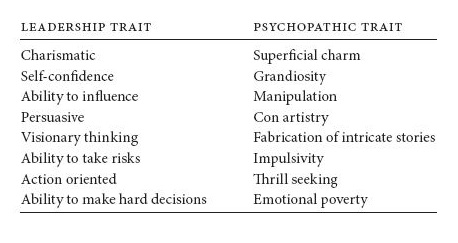Are psychopaths more likely to become criminals… or CEOs?
.
Many psychopathic traits are more common in business leaders than in mentally disturbed criminals.
Via The Wisdom of Psychopaths: What Saints, Spies, and Serial Killers Can Teach Us About Success:
In 2005, Belinda Board and Katarina Fritzon of the University of Surrey conducted a survey to find out precisely what it was that made business leaders tick. What, they wanted to know, were the key facets of personality that separated those who turn left when boarding an airplane from those who turn right? Board and Fritzon took three groups— business managers, psychiatric patients, and hospitalized criminals (both those who were psychopathic and those suffering from other psychiatric illnesses)— and compared how they fared on a psychological profiling test. Their analysis revealed that a number of psychopathic attributes were actually more common in business leaders than in so-called disturbed criminals— attributes such as superficial charm, egocentricity, persuasiveness, lack of empathy, independence, and focus— and that the main difference between the groups was in the more “antisocial” aspects of the syndrome: the criminals’ lawbreaking, physical aggression, and impulsivity dials (to return to our analogy of earlier) were cranked up higher.
How can this be?
Companies offer money, power, status and control — things any psychopath, white collar or not, is drawn to.
Via The Wisdom of Psychopaths: What Saints, Spies, and Serial Killers Can Teach Us About Success:
The psychopath seeks reward at any cost, flouting consequence and elbowing risk aside. Which, of course, might go some way toward explaining why Belinda Board and Katarina Fritzon found a greater preponderance of psychopathic traits among a sample of CEOs than they did among the inmates of a secure forensic unit. Money, power, status, and control— each the preserve of the typical company director, and each a sought-after commodity in and of itself— together constitute an irresistible draw for the business-oriented psychopath as he or she ventures ever further up the rungs of the corporate ladder.
Wouldn’t people notice these awful traits?
No. Because when business leaders have them, we give them different names:

Join over 275,000 readers. Get a free weekly update via email here.
Related posts:
How To Get People To Like You: 7 Ways From An FBI Behavior Expert
New Neuroscience Reveals 4 Rituals That Will Make You Happy
New Harvard Research Reveals A Fun Way To Be More Successful




